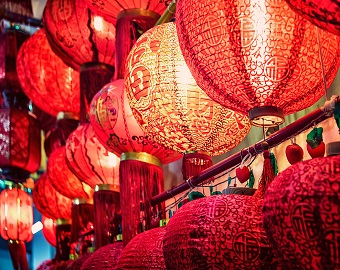Schnellzugriff
- Direkt zur Sitemap
- Direkt zur Suche
- Direkt zur Startseite
- Direkt zu Zugang für Alle
- Direkt zur Navigation
- Direkt zum Inhalt
- Direkt zum Kontakt


It has been a mixed year for investors who put their money into European luxury goods stocks. Since January, the ten largest luxury companies in Europe – represented by the STOXX Europe Luxury 10 index – have delivered a total return of around 12%. This puts the sector slightly behind the overall market: the STOXX Europe 600 has gained around 14.4% over the same period.
This rather modest performance is unusual, as a look at the past shows. Over the past five years, the stocks of Europe's leading luxury companies have generated a total return of 130%, clearly outperforming the European market (STOXX Europe 600: +60%).
The current year has started on a positive note for producers of jewellery, luxury watches and designer handbags. Until the end of April, names such as LVMH, Hermes and Richemont enjoyed a strong upward trend on stock markets. However, a bumpy ride during summer was followed by a slump in the third quarter: the STOXX Europe Luxury 10 index lost around a fifth of its value between its high in April and its year-low at the end of October. Since then, the index has recovered slightly.
China's recovery remains fragile
There are a number of reasons why investors are wary of luxury goods equities, but one of the most important is likely to be China. The People's Republic is one of the most important markets for the luxury sector. At the beginning of the year, hopes were high that the industry would benefit from China's economic recovery following the end of the zero-Covid strategy. The return of Chinese consumers was expected to offset declining demand elsewhere at least partially. In fact, the business environment for luxury goods in Europe and the US has already cooled during the previous year as consumers cut spending in the face of rising prices.
But as the year draws to an end, the hoped-for economic boom in China has not materialised. Although the world's second-largest economy is growing according to official data from the Chinese authorities, the recovery remains fragile. The government in Beijing is facing numerous problems, with the domestic real estate crisis in particular causing turbulence. This prompted the International Monetary Fund (IMF) in October to lower its growth forecasts for China in 2023 and 2024.
Long-term outlook intact
Despite the current difficulties for luxury goods companies, there are some bright spots. Rising prosperity in China should continue to fuel demand for luxury goods. In addition, if the government in Beijing adopts stimulus measures to achieve its growth targets, this would be good news for the industry. Last but not least, the recent price correction could provide an entry point into European luxury stocks.
The one-year Barrier Reverse Convertible on Swatch Group and Richemont has a barrier of 69% and pays an annual coupon of 9% (indicative terms).
The one-year Callable Barrier Reverse Convertible on LVMH, Kering, Hermes and Hugo Boss has a barrier of 52% and pays an annual coupon of 10% (indicative terms).
| ZKB Autocallable Barrier Reverse Convertible on worst of adidas AG/Nike Inc/Under Armour Inc 142529760 / CH1425297608 |
| ZKB Barrier Reverse Convertible on worst of adidas AG/Nike Inc/Under Armour Inc 140252445 / CH1402524453 |
| ZKB Barrier Reverse Convertible on worst of adidas AG/Nike Inc/Under Armour Inc 142529680 / CH1425296808 |
| ZKB Barrier Reverse Convertible on worst of adidas AG/Nike Inc/Under Armour Inc 142530063 / CH1425300634 |
| ZKB Autocallable Barrier Reverse Convertible auf Under Armour Inc 142529772 / CH1425297723 |
